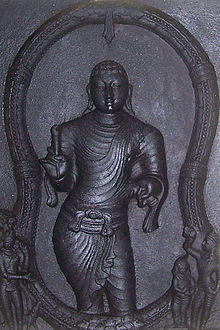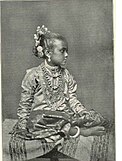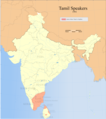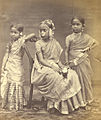The Tamils portal
The
Tamils (
/ˈtæmɪlz, ˈtɑː-/
TAM-ilz, TAHM-), also known as the Tamilar, are a
Dravidian
ethnolinguistic group who natively speak the
Tamil language and trace their ancestry mainly to
India's
southern state of
Tamil Nadu, to the
union territory of
Puducherry, and to
Sri Lanka. The
Tamil language is one of the world's longest-surviving
classical languages, with over 2000 years of
Tamil literature, including the
Sangam poems, which were composed between 300 BCE and 300 CE.
Tamils constitute 5.9% of the population in India (concentrated mainly in Tamil Nadu and Puducherry), 15% in Sri Lanka (excluding Eelam Moors), 7% in Malaysia, and 5% in Singapore. From the 4th century BCE, urbanisation and mercantile activity along the western and eastern coasts of Tamilakam -- what is today Kerala and Tamil Nadu -- led to the development of four large Tamil empires, the Cheras, Cholas, Pandyas, Pallavas, and velirs and a number of smaller states, all of whom were warring amongst themselves for dominance. The Jaffna Kingdom, and vanni chieftaincies inhabited by Eelam Tamils, was once one of the strongest kingdoms of Sri Lanka and controlled much of the north of the island. ( Full article...) Selected article -Anbe Sivam ( transl. Love Is God) is a 2003 Indian Tamil-language slice-of-life drama film directed by Sundar C. and produced by K. Muralitharan, V. Swaminathan and G. Venugopal under the banner of Lakshmi Movie Makers. The film was written by Kamal Haasan, and Madhan provided the dialogues. Anbe Sivam stars Haasan, Madhavan and Kiran Rathod, with Nassar, Santhana Bharathi, Seema and Uma Riyaz Khan playing supporting characters. The film tells the story of Nallasivam and Anbarasu, two men of contrasting personalities who undertake an unexpected journey from Bhubaneswar to Chennai. Produced on a budget of ₹120 million, Anbe Sivam takes on themes such as communism, atheism, and altruism and depicts Haasan's humanist views. The music was composed by Vidyasagar. Arthur A. Wilson served as the cinematographer and M. Prabhaharan served as the art director. ( Full article...)General imagesSelected biography - CategoriesTopicsTamil People Countrywide: India • Sri Lanka • Canada • Malaysia • Singapore • South Africa • England Related Ethnic Groups:
Brahui •
Gond •
Kannadiga •
Khonds •
Kodava •
Oraon •
Malayali •
Telugus •
Tuluvas Related indigenous Groups:
Badagas •
Toda •
Kuruba
See also: List of Tamil people, Tamil script, Tamil Script Code for Information Interchange Related portalsWikiProjectsThings to do
Associated WikimediaThe following Wikimedia Foundation sister projects provide more on this subject:
Discover Wikipedia using
portals |
The Tamils portal
The
Tamils (
/ˈtæmɪlz, ˈtɑː-/
TAM-ilz, TAHM-), also known as the Tamilar, are a
Dravidian
ethnolinguistic group who natively speak the
Tamil language and trace their ancestry mainly to
India's
southern state of
Tamil Nadu, to the
union territory of
Puducherry, and to
Sri Lanka. The
Tamil language is one of the world's longest-surviving
classical languages, with over 2000 years of
Tamil literature, including the
Sangam poems, which were composed between 300 BCE and 300 CE.
Tamils constitute 5.9% of the population in India (concentrated mainly in Tamil Nadu and Puducherry), 15% in Sri Lanka (excluding Eelam Moors), 7% in Malaysia, and 5% in Singapore. From the 4th century BCE, urbanisation and mercantile activity along the western and eastern coasts of Tamilakam -- what is today Kerala and Tamil Nadu -- led to the development of four large Tamil empires, the Cheras, Cholas, Pandyas, Pallavas, and velirs and a number of smaller states, all of whom were warring amongst themselves for dominance. The Jaffna Kingdom, and vanni chieftaincies inhabited by Eelam Tamils, was once one of the strongest kingdoms of Sri Lanka and controlled much of the north of the island. ( Full article...) Selected article -Anbe Sivam ( transl. Love Is God) is a 2003 Indian Tamil-language slice-of-life drama film directed by Sundar C. and produced by K. Muralitharan, V. Swaminathan and G. Venugopal under the banner of Lakshmi Movie Makers. The film was written by Kamal Haasan, and Madhan provided the dialogues. Anbe Sivam stars Haasan, Madhavan and Kiran Rathod, with Nassar, Santhana Bharathi, Seema and Uma Riyaz Khan playing supporting characters. The film tells the story of Nallasivam and Anbarasu, two men of contrasting personalities who undertake an unexpected journey from Bhubaneswar to Chennai. Produced on a budget of ₹120 million, Anbe Sivam takes on themes such as communism, atheism, and altruism and depicts Haasan's humanist views. The music was composed by Vidyasagar. Arthur A. Wilson served as the cinematographer and M. Prabhaharan served as the art director. ( Full article...)General imagesSelected biography - CategoriesTopicsTamil People Countrywide: India • Sri Lanka • Canada • Malaysia • Singapore • South Africa • England Related Ethnic Groups:
Brahui •
Gond •
Kannadiga •
Khonds •
Kodava •
Oraon •
Malayali •
Telugus •
Tuluvas Related indigenous Groups:
Badagas •
Toda •
Kuruba
See also: List of Tamil people, Tamil script, Tamil Script Code for Information Interchange Related portalsWikiProjectsThings to do
Associated WikimediaThe following Wikimedia Foundation sister projects provide more on this subject:
Discover Wikipedia using
portals |





























































